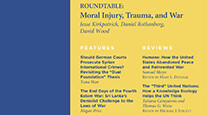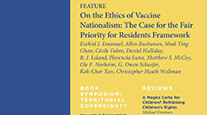Justice for Hedgehogs, Ronald Dworkin (Cambridge, Mass.: Belknap Press/Harvard University Press, 2011), 506 pp., $35 cloth.
In this rich, complex, and closely argued book, Dworkin boldly affirms the independence of arguments of value, arguments that remain securely within their own domain. Mostly, but not at all exclusively, he is concerned with moral value. He claims it is wrong to assume that external forces could force conflict between moral values on us, as Isaiah Berlin and others have urged. Rather, he says we should be more confident in justifying our judgments of value by reference to the more abstract values we hold; we also have a personal responsibility for making our judgments coherent. "Value judgments are true, when they are true . . . in view of the substantive case that can be made for them" (p. 11).
These ideas together form what he calls the "unity of value" thesis, the "big thing" that the hedgehog knows in Archilochus's comparison of the fox and the hedgehog, famously used by Isaiah Berlin. Take the well-known supposed conflict between freedom and equality in the distribution of resources. If we think that people are of equal value as human beings but also that people should be free to keep what they have worked for, we must try to see in what ways equality and freedom need to be qualified to respect both values. We cannot simply discard either value if it is inconvenient, say, by denying people equality of bargaining power but affirming maximum freedom for the market: "You cannot determine what liberty requires without also deciding what distribution of property and opportunity shows equal concern for all" (p. 4).
Justice for Hedgehogs is a masterwork that offers many clear and confident solutions to major problems of morality. The first part of the book is a ringing endorsement of Hume's distinction between fact and value, and it claims for value both independence and objectivity. The second half takes up the challenge of justifying our moral judgments and is broadly an endorsement of Kant on morality, with a plausible addition (or extrapolation): that "living well" might responsibly include an integrated balance—even a trade-off—between personal ethics and morality. As usual, Dworkin engages with the best contemporary thinkers who address these sorts of questions and, hence, it is a book that tells us, too, what they have to say. And it is monumentally conceived, for Dworkin asks us to incorporate other large books of his within it, notably on legal philosophy (Law's Empire and Justice in Robes) and political philosophy (particularly Sovereign Virtue).
To read or purchase the full text of this article, click here.



